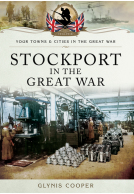Who Stole the Secret to the Industrial Revolution? (Hardback)
The Real Story behind Richard Arkwright and the Water Frame
Imprint: Pen & Sword History
Pages: 184
Illustrations: 16 black and white illustrations
ISBN: 9781473875913
Published: 3rd February 2023
(click here for international delivery rates)
Order within the next 2 hours, 6 minutes to get your order processed the next working day!
Need a currency converter? Check XE.com for live rates
| Other formats available - Buy the Hardback and get the eBook for £1.99! | Price |
|---|---|
| Who Stole the Secret to the Industrial… ePub (15.9 MB) Add to Basket | £6.99 |
English schoolchildren are taught that Sir Richard Arkwright ‘invented the water-frame and was the father of the Industrial Revolution and the factory system.’ That is simply not true. The water-powered spinning frame and the ‘modern factory system’ were pioneered in Italy over 300 years before Richard Arkwright was born.
This book tells the story of how the Industrial Revolution in textile manufacture really began. Not in England with Richard Arkwright and the English cotton industry, but in Italy, with Italian Renaissance engineers and the Italian silk industry. Proof lies in the achievements of medieval Italian engineering, English archives and English legal case records.
Italy was the leading technological power in Europe from the 13th to the 17th centuries. The Italian Renaissance and the devastation caused by the Black Death (1347-49) brought forth a wealth of technological innovation and invention and the Italians automated much of the production of silk fabrics, using water as their power source, because there were no longer enough people left alive to carry out the work.
English organzine was inferior to Italian organzine. In the first recorded case of industrial espionage a young Derby engineer resolved to steal Italian silk manufacturing secrets. Water powered silk throwing machinery, reconstructed by John Lombe from his stolen plans and drawings, provided the blueprint for water powered cotton spinning machinery (water frame), and Cromford Mill, (built 1771), was modelled on Derby Silk Mill (built 1719).
This book marks the 300th anniversary of John Lombe’s premature death. Part of the mystery surrounding his actions is why has the truth been concealed for so long and why has the Italian connection remained unacknowledged? It is time to place this episode of history in a proper context, to set the record straight, and to fully acknowledge the part played by Italy in the English Industrial Revolution.
"This is an interesting book shedding light on the dark world of the early textile industry".
The Society of Model and Experimental Engineers Journal - June 20232
As featured in: Derbyshire Book Club
Derbyshire Life
Rating: 5 out of 5 stars
NetGalley, Norma Fourchalk
My inner history geek was exuberant at gaining access to this book! Just this week I’ve finished teaching the Industrial Revolution and my students have memorised Richard Arkwright, James Hargreaves, Samuel Crompton, Edmund Cartwright, Eli Whitney and John Kay and their contributions to the textile revolution in England in anticipation of our test next week. Imagine my shock at discovering what I’d so laboriously taught was incorrect! Now I feel responsible to add another lesson focusing on what I’ve learned this weekend - Richard Arkwright was a successful entrepreneur and a successful self-promoter.
The focus of this fantastic book is an examination of the rivalry that existed between Britain and France and the methods each used to gain an advantage over the other. The author suggests that while tourists were heading to admire Europe’s masterpieces, savants travelled Europe with the sole purpose of enlightening their economy. In short, there was a plague of industrial espionage in 18th-century Europe and ‘intelligent travel’ was the means of securing knowledge of mechanical advances.
This book aptly refutes and gives evidence to the contrary for two mistakes made in history: (1) Richard Arkwright did not invent the water frame and (2) he was not the Father of the British Factory System.
I was spellbound reading about ‘owlers,’ the far-reaching power of Cosimo de Medici, and the fight for organzine. Perhaps I was most shocked by the revelation of Zonca’s book sitting on a shelf in the Bodleian Library in Oxford while the court cases and accusations were happening! It truly was fascinating to sit at the crossroads of science and capitalism and watch it all play out from the sidelines.
This is a fascinating book, a quick read, that sets the record straight and acknowledges Italians and their role in the development of the textile industry in Britain.
About Glynis Cooper
Glynis Cooper's family has its roots in the industrial millscapes of Manchester. She was born in Stockport, but she grew up near Bury St Edmunds and subsequently spent ten years living and working in Cambridge before returning to Manchester. Her parents were writers who inspired her enthusiasm for the written word. Glynis, who loves islands and the open countryside, trained in the dual disciplines of librarianship and archaeology. She enjoys reading, researching and writing local histories, travelling and playing chess.




















